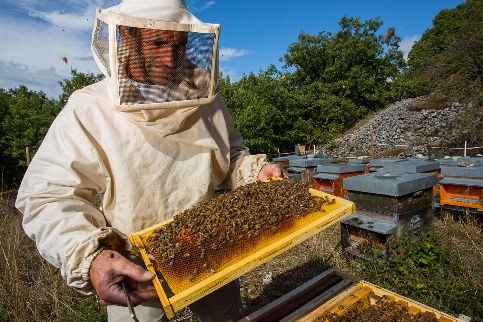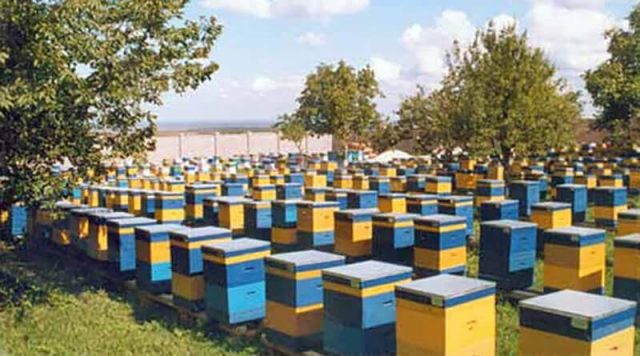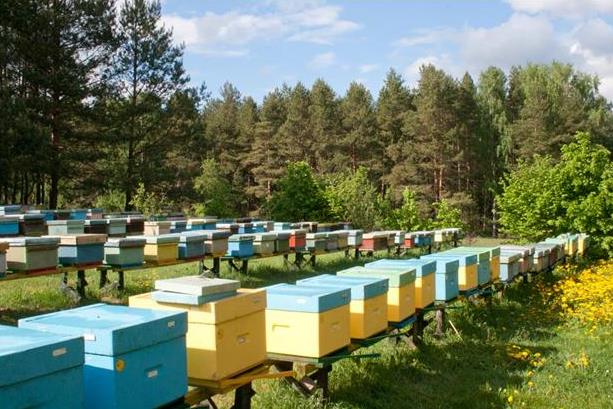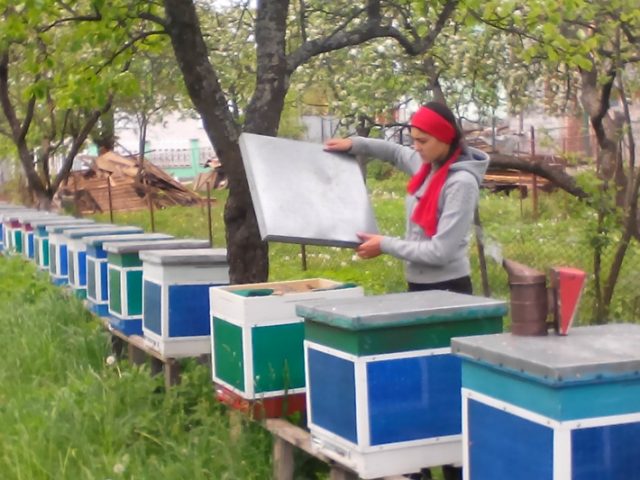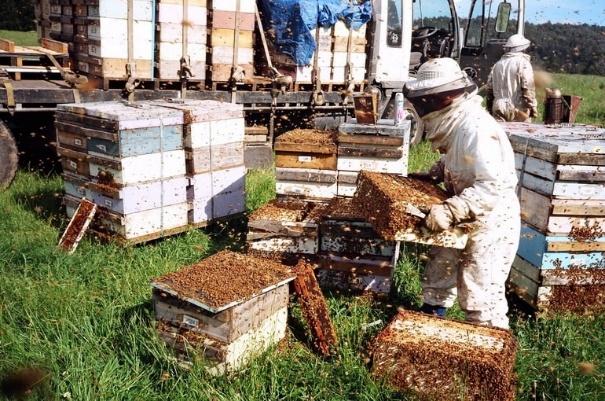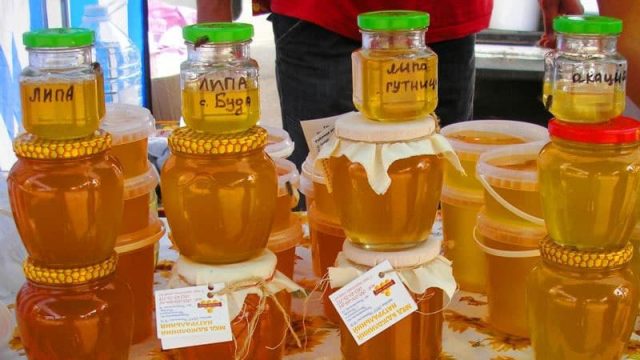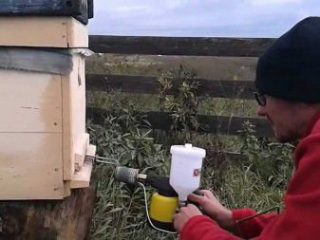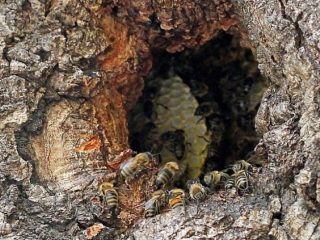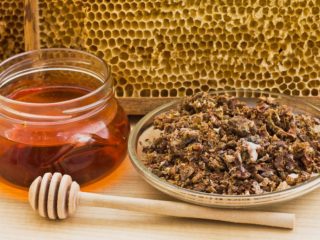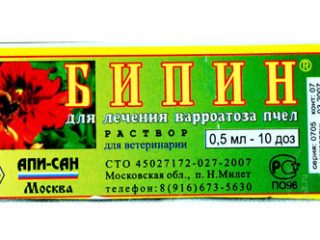Content
Beekeeping as a business is one of the few almost win-win activities in agriculture. There is always a demand for products produced by bees. Of course, commercial beekeeping already requires certain skills and knowledge. You cannot start beekeeping as a serious business without knowing anything at all about bees. But a similar situation exists in any field of agriculture: before you engage in animal husbandry or crop production, you need to gain experience.
Beekeeping as a business: profitable or not
A person will always pay for food. But growing food is a high-risk area: crop failures and epizootics can cripple the farmer. People will give their last money for treatment. In the field of agriculture, a business such as beekeeping is one of the most profitable industries, as it combines both food and medicine.
With the right approach, running an apiary as a business is no more risky than a poultry farm. But the investments needed are much smaller.Moreover, you even need less space for an apiary than for any more or less serious farm.
It is also profitable to keep bees because absolutely all beekeeping products are used. No food storage is required in beekeeping. If owners of livestock and poultry farms need to think about where to keep feed and where to dispose of waste, then the beekeeper receives income from the sale of propolis and tinctures from it.
Profitability of beekeeping
Profitability is not quite what is meant by it in everyday conversations. Profitability is a ratio that is defined as profit divided by...
But what the profit will be divided into, and whether this profit should be net, depends on what kind of profitability needs to be calculated.
To calculate the profitability of an apiary, you need to decide what exactly to calculate:
- the profitability of the enterprise after the initial investment is recovered;
- the cost of supplies, including the possible purchase of new families;
- seasonal income from the sale of bee products.
The high profitability of bees as a type of business is explained primarily by the fact that in beekeeping the initial investments are very low. If you have the tools, materials and skills acquired in school craft lessons, you can make beehives yourself. A garden plot with a vegetable garden would be suitable for an apiary. The most risky expenditure is on the purchase of bee colonies. Equipment for pumping out honey can be sold even if it fails.
Apiary income
Earning money from bees depends on many factors:
- honey;
- propolis;
- royal jelly;
- drone homogenate;
- beebread;
- wax;
- tinctures from dead animals.
Oddly enough, the familiar honey is the cheapest product in beekeeping.It also has the largest range in prices. Therefore, the price of honey will depend on the region where the beekeeping business is planned and the type of plants from which the product is collected.
Apiary as a business: where to start
If you have no experience in beekeeping as a business, it is better to first gain it with 2-3 hives in order to understand how to properly keep bees. There are often cases when, due to inexperience, beekeepers destroy colonies with their own hands. You can think about making money from a bee apiary a couple of years after the appearance of the first hives. Moreover, bees swarm in summer, and the number of colonies can be increased without financial costs.
If you already have experience, it makes sense to start immediately by purchasing several dozen colonies. But an apiary with 10 colonies is already considered sufficient to generate a small profit. True, it also has a high risk of extinction of all families in the event of an unfavorable combination of circumstances.
In addition to bee colonies and hives, setting up a beekeeping business also requires some equipment. The latter is profitable to buy if the apiary has at least 50 colonies.
Organizing a beekeeping business and calculating the number of hives begins with an inspection of the proposed site. Or they resign themselves in advance to the thought of serious financial investments in the purchase of a large car trailer for organizing a nomadic apiary.
Apiary placement
For their own needs, citizens can place hives on their plots, subject to sanitary and veterinary requirements.
For a serious business in beekeeping, there are already certain rules:
- there cannot be more than 150 hives in one apiary;
- the stationary apiary along the perimeter of the territory is fenced and planted with fruit trees and bushes;
- free areas are annually plowed and sown with honey-bearing grasses;
- the distance between hives should be 3-3.5 m, and between rows - 10 m;
- a stationary apiary is placed no closer than half a kilometer from railways, power lines, sawmills, and federal roads;
- hives cannot be placed closer than 5 km from chemical enterprises. industry and confectionery shops, sources of microwave radiation.
First of all, when selecting a site, pay attention to these requirements. Next, the number of honey plants in the selected location is assessed.
Bees can collect the maximum bribe if they do not have to fly further than 2 km. At the same time, there should be at least 2000 honey plants per 1 hectare of area. This quantity includes:
- garden trees;
- meadow forbs;
- forest trees.
After assessing the possibilities for collecting honey, a place for the apiary itself is chosen. If there is no particular choice, and the apiary will be located in the garden on a personal plot, the hives are placed in the shade of trees. The area is surrounded by a 2-meter fence to protect it from the wind.
The stationary apiary is also equipped with rooms for storing equipment, spare hives and honey extraction equipment. Plumbing facilities must also be provided.
Nomadic apiary
In the absence of a suitable site for a “stationary” business, you can make a nomadic apiary, but the requirements for it are stricter:
- placement of nomadic apiaries in honey collection areas at a distance of at least 1.5 km from one another;
- at least 3 km from stationary apiaries;
- It is prohibited to place nomadic apiaries on the flight path of bees from another apiary to the main honey collection;
- when placing on someone else's property, an agreement is required between the beekeeper and the owner of the land;
- The beekeeper must take measures to ensure the safety of people and animals. He is also entrusted with the responsibility of preventing the entry of strangers into the apiary.
Due to the worldwide decline of bees and the spread of diseases among them, the owner of a nomadic business must notify local authorities of his plans before moving to a new location. Further information to the veterinary service falls on local governments.
A nomadic apiary has an advantage over a stationary one: the owner can transport bees to the best places.
In cold regions, for both types of beekeeping business, it is necessary to provide a ventilated winter road, in which it will be possible to maintain a temperature of 0-6 ° C and a humidity of no more than 85%.
For both types of apiaries, choose a flat area overgrown with trees with a slight slope. Trees are needed to hide the hives from the heat in the shade.
Beehives and necessary equipment
According to reviews, when running a bee business, the main expense item is hives. Even a bee colony costs less than a high-quality hive. The cost of a “house for bees” is about 4,000 rubles. The hive must be made of quality wood.
The resin released in the heat will “glue” the bees to the walls. A good option is aspen, which is difficult to rot.
You should not use plywood hives. Water will cause this material to delaminate and warp. Foreign attempts to use polystyrene foam instead of wood were also unsuccessful: such material turned out to be too light and fragile, although from the point of view of thermal insulation it is ideal.
In addition to hives, you will need a lot of other things that may not be taken into account when calculating business expenses:
- framework;
- beekeeper costume;
- smoker;
- swarm net;
- veterinary preparations for treating families;
- foundation;
- honey extractor;
- equipment for the production of foundation;
- smoker material;
- special cages for queen bees;
- various carpentry tools.
The latter can be found in any subsidiary farm. Equipment for waxing can also be purchased later, when it becomes clear that the business has exited the unprofitable stage. But you can get by by buying wax in the store.
Purchase of bee colonies
When purchasing colonies, you need to take into account the species composition of honey plants near the apiary and climatic conditions. Today there are quite a few breeds of bees that work better on certain plants:
- Central Russian bees: linden and buckwheat. Aggressive and prone to swarming.
- Caucasian grays are non-aggressive, but do not tolerate cold weather. They work well on clover and meadow forbs. They don’t steal honey, and they don’t allow strangers near their hives. This breed is not very productive.
- Ukrainian steppe plants are preferred for linden, buckwheat, sunflowers, and other honey plants. They tolerate winter well and are resistant to nosematosis and European foulbrood.
These breeds are the most common in Russian beekeeping. In addition to them, you can buy local bees or their crosses with other breeds. For beekeeping, local breeds have the advantage of being well adapted to a specific climate, but productivity may be low.
The cost of bee colonies is about 2000 rubles. But depending on the thoroughbred of the colony, it may be higher.
Work in the apiary
At first glance, an apiary is a very calm and easy job. In fact, according to reviews from people involved in beekeeping as a business, there is no time left for anything other than working in the apiary.In this business, the worries begin in early spring, when it is necessary to transplant the bees into clean hives, and last until the fall.
During the apiary season, it is necessary to periodically mow the grass so that it does not cover the entrance. In front of the hives, areas of 0.5 x 0.5 m are equipped, on which the bees throw out dead wood and other garbage. These areas must be cleared of debris. During the season, drone brood is collected for homogenate and royal jelly.
In the fall, they inspect the colonies and decide how many colonies to leave for the winter. You also need to collect mature honey, propolis and bee bread.
For the winter, the hives need to be placed in a winter hut. If the climate allows and the bees tolerate cold well, the colonies can be left to winter in the open air. In winter, the beekeeper also has something to do:
- check and clean reserve hives;
- repaint them all;
- make frames;
- make wax.
But in winter the work is less stressful than in the season.
Start-up capital
In a beekeeping business, initial costs largely depend on:
- apiary size;
- a plot of land for it;
- land owned or leased;
- stationary or nomadic apiary;
- the cost of processing all documents.
With a maximum possible size of 150 hives, initial costs can reach 2 million rubles. If the business starts with 5-10 hives in your own garden plot, then the costs are minimal (40-70 thousand rubles), but the income will be small.
To transport the hives closer to the honey plants, you will need a trailer. These are the costs in beekeeping that will not exist in the case of a stationary apiary.
Is there a risk
There is no business without risk at all. A bee apiary as a business object is no exception. Bees can get sick or die from frost. The year may turn out to be cold and the colonies will not collect enough honey.But any farmers find themselves in the same situation. Crop failures occur frequently.
The peculiarity of Russia is its cold climate, which makes beekeeping difficult as a business. In a very cold winter, the colony may freeze out. But bees can also die if the ventilation is blocked with insulation.
An untimely reduction in the number of varroa mites leads to a weakening of the colony due to the proliferation of parasites. Varroa sucks the bees' lymph and the insects die.
It is also necessary to monitor the occurrence of diseases in bees. Contrary to what many people believe, bees suffer from invasive diseases. These infections are caused by protozoa that live in the bee's intestines.
Income from beekeeping
Income from a beekeeping business, according to beekeepers themselves, is very unpredictable. Much depends on how strong the family is. You can only get income in this business from a strong colony. The weak one will have to be fed, and the middle one will only be able to provide for itself.
The maximum income for a beekeeping business comes from nomadic apiaries, which are taken as close to the honey plants as possible. From a strong colony with this method of beekeeping you can get 40 kg of honey per season. At stationary production, the yield of the product will depend on the number of honey plants in the area.
If we take the maximum yield and assume that all families are equally strong, then the amount of honey can be simply multiplied by the number of hives. In reality this does not happen. Therefore, if an apiary consists of 10 hives, from a total of 400 kg, you can safely subtract about 50 kg. 100 hives of a nomadic apiary will not produce 4 tons of honey. But more than 3500 kg will probably come out.
To calculate income, it is enough to multiply the average output by the average price of a kilogram of honey. The cost of honey varies from region to region.Likewise, types of honey also have different prices.
Sales of finished products
Sales in this type of business depend entirely on the resourcefulness of the beekeeper. Honey can be sold:
- by advertisement;
- independently on the market;
- hand over to a reseller;
- Organize your own company store with your friends.
There is another option: the beekeepers union publishes its own free newspaper, which is distributed to mailboxes. The newspaper contains advertisements for the centralized sale of honey and discounts on products.
Prices for honey and bee products
The price of honey varies significantly depending on its variety. Most valued:
- buckwheat;
- lime;
- acacia;
- mint.
The cost of honey ranges from 300 to 1200 rubles. Therefore, prices should be checked in the local market. In the south, acacia honey will cost less than in the north.
With an apiary size of 100 families and a honey yield of 3500 kg, at a minimum cost per kilogram you can get 3500x300=1050 thousand rubles. With a maximum cost of 1200 rubles. you can get 4200 thousand rubles.
An amateur apiary of 10 hives will generate income after selling honey at a minimum price of 105 thousand rubles, at a maximum price of 420 thousand rubles.
Accordingly, 10.5 thousand rubles come out of the hive. and 42 thousand rubles. But the numbers are approximate; the beekeeping business is one of the most unpredictable in terms of obtaining products.
Moreover, in fact, even in the most favorable scenario, the real profit will be less. From the amount received, you must subtract the costs of maintaining the apiary and taxes.
This allows the beekeeper to hold onto the product until prices increase.
Is it profitable to engage in beekeeping: counting the profit
Beekeepers themselves traditionally complain about the lack of government support for beekeeping and business difficulties. Judging by the reviews of those who run an apiary as a business, everything is very bad. But they are not ready to give up beekeeping and switch to breeding chickens, rabbits or nutria.
There are other reviews from which it follows that a beekeeper cannot become a millionaire, but it is possible to support his family with dignity by doing beekeeping. Of course, you will have to work, and not sit with a cup of tea and a saucer of honey on the veranda.
Business on bees
Due to the frequent separation of families, other queens are in demand in significant quantities. In addition, a colony of bees costs more than a single queen. If you need to breed purebred bees, you can buy a fertilized queen and place her in a “mongrel” colony. A purebred queen purchased in the spring will “replace” the outbred livestock of the family in one season. Thanks to this, if a beekeeper has purebred bees, he can sell both queens and new young swarms to others.
Selling queens as a separate type of business in beekeeping is quite profitable, since working individuals wear out quickly in the summer. Their lifespan is about 30 days.
The cost of queens ranges from 600 to 950 rubles. regardless of breed. Pricing in this area depends more on the wishes of the bee owner than on objective factors.
Normally, bees only need one queen. When the former queen grows old, the colony will feed another one, and the old one will be killed. There are usually not many queens in a hive. Therefore, if the business is aimed at obtaining honey, you will not be able to earn much from queens. From strength to 10 thousand rubles. in year.
The same applies to the sale of bee colonies at a price of 2 thousand rubles.You can earn even less on them, since fewer new swarms are “born” than queens. In order not to weaken families, it is better to prevent swarming. Usually the beekeeper keeps the new swarm for himself.
The business of selling bees is carried out by specialized nurseries, for which honey is already a low-income by-product. Bees can be forced to raise many queens per season, but then they will not be able to fully collect honey.
How else to make money from bees
Bee products as medicines continue to gain popularity today. A business can be built not only on the sale of honey, but also on the sale of other beekeeping products:
- bee bread – 4000 rub./kg;
- propolis – 2200-4000 rubles/kg;
- royal jelly – 200,000 rubles/kg;Important! The freshly collected vegetables are placed in the refrigerator within 2 hours, otherwise they will spoil. Processed products can be stored at room temperature for no more than 3 days, in the freezer - up to 2 years.
- drone homogenate – 30,000 rubles/kg;Important! Drone jelly can only be stored in the freezer, frozen immediately after receiving. It cannot be re-frozen. The shelf life of thawed homogenate is 3 hours.
- death;
- wax – 300-450 rub/kg.
The main product of beekeeping is honey. The rest are by-products in the business, and they are obtained from the hive in small quantities, except for beebread, which is not much inferior in quantity to honey:
- wax – 1.5 kg;
- beebread – 10-20 kg;
- propolis – no more than 80 g per season per family of gray Caucasian bees;Attention! Other breeds produce 2 times less propolis.
- royal jelly – 450 g.
The exact amount of drone homogenate from the hive is unknown.But this product allows the beekeeper to “kill two birds with one stone”: gain additional income in business and reduce the number of varroa mites in the bee colony.
There is no point in rejoicing over a large amount of waste. This is an indicator of a sick family. Podmor – dead bees. At best, “worn out” working individuals, at worst, dead from illness. Since the second option usually causes the entire colony to die out, you can reduce business losses by making a tincture of dead fish with vodka or alcohol. 100 ml of tincture costs 400 rubles.
Conclusion
Beekeeping as a business is a profitable investment. But, like any serious business, it requires complete dedication. Beekeeping is also a good option for a family business in the village.
